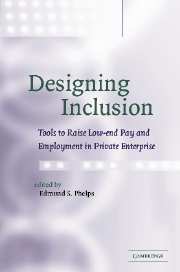Book contents
- Frontmatter
- Contents
- List of figures
- List of tables
- List of contributors
- Introduction
- 1 Low-wage employment subsidies in a labor-turnover model of the “natural rate”
- 2 Taxes, subsidies and equilibrium labor market outcomes
- 3 Learning-by-doing versus on-the-job training: using variation induced by the EITC to distinguish between models of skill formation
- 4 Unemployment vouchers versus low-wage subsidies
- Index
2 - Taxes, subsidies and equilibrium labor market outcomes
Published online by Cambridge University Press: 22 September 2009
- Frontmatter
- Contents
- List of figures
- List of tables
- List of contributors
- Introduction
- 1 Low-wage employment subsidies in a labor-turnover model of the “natural rate”
- 2 Taxes, subsidies and equilibrium labor market outcomes
- 3 Learning-by-doing versus on-the-job training: using variation induced by the EITC to distinguish between models of skill formation
- 4 Unemployment vouchers versus low-wage subsidies
- Index
Summary
Abstract
We explore the effects of taxes and subsidies on job creation, job destruction, employment and wages in the Mortensen-Pissarides version of the search and matching equilibrium framework. Qualitative analytical results show that wage and employment subsidies increase employment, especially of low-skill workers, and also increase wages. A job creation or hiring subsidy reduces unemployment duration but increases incidence, with an ambiguous effect on overall employment. A firing tax has the reverse effects but the same indeterminacy. In the special case of a competitive search equilibrium, the one in which search externalities are internalized, there is a first-best configuration: no tax on the wage, an employment subsidy that offsets the distortions on the job destruction margin induced by unemployment compensation and employment protection policy, and a hiring subsidy equal to the implicit tax on severance imposed by any form of employment protection, with the costs of these and other policies financed by a non-distortionary consumption tax. Computational experiments confirm this ideal also determines the direction in which marginal improvements can be made both in terms of efficiency and in terms of improving low-skill worker employment and wage outcomes.
Introduction
Our purpose is to consider various tax and subsidy effects on wages and unemployment within the search and matching labor market framework.
- Type
- Chapter
- Information
- Designing InclusionTools to Raise Low-end Pay and Employment in Private Enterprise, pp. 44 - 73Publisher: Cambridge University PressPrint publication year: 2003
- 30
- Cited by



